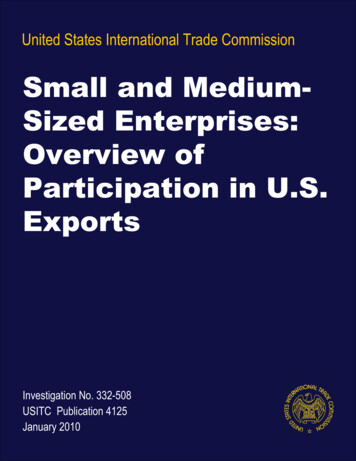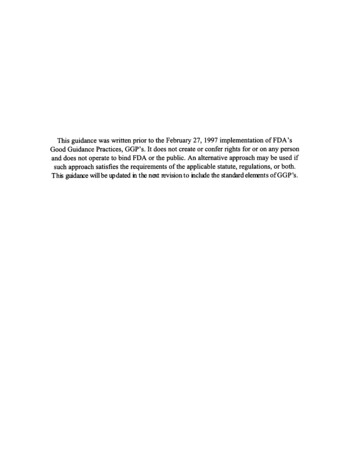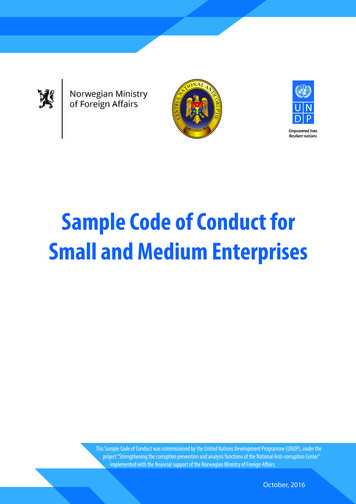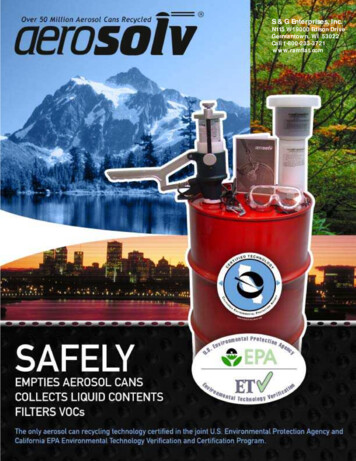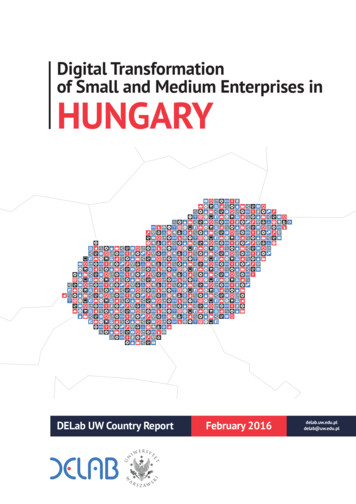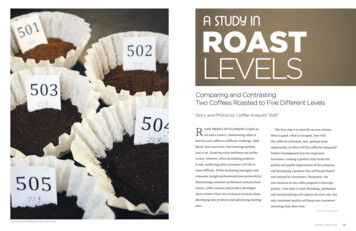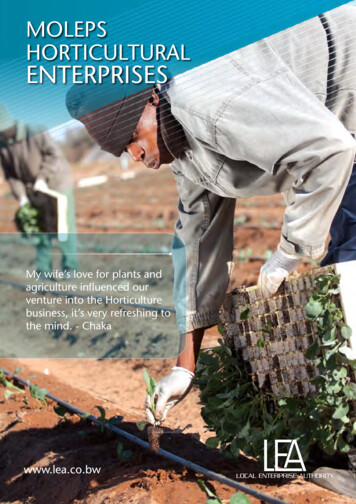
Transcription
MOLEPSHORTICULTURALENTERPRISESMy wife’s love for plants andagriculture influenced ourventure into the Horticulturebusiness, it’s very refreshing tothe mind. - Chaka
n4Involvement with LEA6Opportunities7The LEA Business Advisor8The Molepolole Branch Manager9Future Plans10Mr and Mrs Keoagile, Directors of Moleps Horticultural EnterprisesA quick drive of about six kilometres to thenorth of Molepolole Main Kgotla takes oneto Moleps Horticultural Enterprises (PTY)LTD [MHE], an enterprise that has beenin operation since September 2011. Thebusiness is located in Suping Ward andoperates from a 5 hectare (Ha) plot, ofwhich only 3 of the 5 hectares are taken upby the business.Mr Chaka Keoagile, one of the Directorsof MHE was born and bred in Molepolole.A father of two boys, he is married to MrsKoketso Keoagile. He attended his Primary,Junior and Senior Secondary Schooleducation in Molepolole. He worked fora period of three years at BP and thenventured into a driving school business.He later started a taxi and combi business,which he is currently running in parallelwith the horticulture business. Chaka, asthe Managing Director is responsible forthe day to day operations of MHE. He alsohandles marketing for the business. Hiswife - Koketso, who is also a Director in thebusiness, supports him when she can.MHE employs a total of eight people,excluding the two Directors. All theemployees joined the business withoutany prior training or experience in thehorticultural landscape, but over a periodof time, they have gained all the necessaryexperience and have become one of themost invaluable resources in the business.MHE products are tomatoes (0.5 Ha),cabbage (1.5 Ha), green pepper (0.5 Ha)and butternuts (1 Ha). Chaka advises thatthey have decided to use hybrid seedsbecause they have many advantages; theyare resistant to most diseases, they have ahigh yield, and they grow fast. Chaka givesan example of the type of tomato theygrow – the ‘Indeterminate’. He says thatthe ‘Indeterminate’ tomatoes can grow ashigh as six meters, also that as it grows,it produces its fruits in bundles insteadof singles. In addition, the fruits ripen atdifferent times. This is highly advantageousespecially during peak season wheneveryone is selling. The major advantageof this type of tomatoes is that they canbe harvested continuously over a periodof up to about nine months. The tomatoesalso have a longer shelf life as compared tothe other breeds. Chaka advises that theyuse chicken manure which they sourcefrom a nearby poultry farm. They alsouse commercial fertilisers. The method ofapplication for the commercial fertilisersis called ‘fertigation’, which is defined insimple terms as - dissolving the fertilizerin water and “feeding” the solution to theplants through the drip irrigation system.Chaka says his wife’s love for agricultureinfluenced their venturing into theHorticulture business. He says that his wife’slove for plants rubbed off on to him as hediscovered the calming and refreshingnature of plants to the mind. His wife’sinterest in farming has been there from herformative years. Chaka says his wife was anactive member of the 4B Club in primaryschool when she was younger, a club thattaught her all that she needed to know tostart and maintain a garden at home. Thiscultivated her love for gardening evenmore that she dreamt of owning a farm inthe future. Chaka reiterates that when shesold him the idea of starting a horticulturebusiness, he humoured her, and evenenrolled for a short course at the SebeleRural Training Centre (RTC), a decisionwhich he considers the best he has donein a long time!Chaka sees it fit to take a moment toexpress gratitude for the suppliers of theproducts they need for the business, forexample, Agrichem, Dicla and Hygrotech.He reiterates their reliability and qualityproducts they supply. As we chat to Chaka,in the background is the harmonioussound of the borehole pump powered bya three phase electricity supply, providingthe much needed water for the crops.
Mr and Mrs Keoagile, at the cabbage fieldSpring onions ready for transplantationThe directors doing there daily routine in thetomato fieldAs the saying goes, “you re what you eat,” Chaka is very much awake to the importance of quality.At MHE, they ensure quality produce, because they understand that it translates into healthy andhappy customers, who will keep coming back for more. This business however, like any othersuccessful business, has its ups and downs. Chaka catalogues some of the production challenges asfollows: Pests – this challenge calls for awell-articulated plan to preventand combat attacks Weather – extremely hightemperatures at times (especiallyfor plants outside the shadenetting) Acidic soil – this required that,among others, MHE employs theuse of lime to reduce the aciditylevels to one that is conducive forcrop production Power cuts and boreholebreakdowns causing peppers and tomatoes tocrack. This is because ideally theyshould be watered consistently atthe same time, with the sameamount of water and for the sameduration every day. At peak times there are pricewars - some customers will forinstance disregard quality and gofor cheaper and yet inferiorproduce, with the notion thatafter all “a cabbage is a cabbage”.
5MOLEPSHORTICULTURALENTERPRISESLEA Business Advisors,experienced farmers andAgriculture Officers haveimparted and rendered expertadvice and support to MHE.Employee transplanting morogoStarting MHE came with its challenges, some of which are discussed below: Surveying the wrong plot for water, mainlybecause the land was completely bushy,Chaka realized this unfortunate fact afterbeing approached by the owner of aneighbouring plot who had noticed anencroachment on his land. He eventuallyhad to engage a new surveyor because inany case the first survey drew a blank – healso then discovered that first surveyor wasapparently a diviner. He remembers with asmile how they were cheated, but quicklypoints out that it was a lesson for them, thatthey were now wiser and therefore enlistedthe services of a Geophysics. Rigidity of financial institutions when it comesto disbursements of funds. Chaka advises thatone of the financiers they engaged was notforthcoming in instances where they neededadditional funds for procuring seeds (forexample). Chaka attributes this unreasonablestance to the mistrust the financiers havebased on past experiences where peoplewould use money for personal gain.
6MOLEPSHORTICULTURALENTERPRISESInvolvement with LEAChaka’s wife, Koketso, approached LEA in 2009, afterbriefly reading about the organization on the localnewspaper. She subsequently registered with theorganization. Koketso advises that her initial perceptionof LEA was that, they developed and wrote businessplans for aspiring business people. After engaging withLEA, she then realized that contrary to her belief, LEAfacilitates and assists one develop their own businessplan. This helps create a sense of ownership in theproject on the part of the potential business owner.Koketso therefore made a commitment to developingthe business plan herself, she advises other potentialbusiness owners alike to do the same because as sherightly and confidently puts it - “why pay someone todo something you can do yourself?”Thereafter, LEA advised her and her husband on landrequirements for the type of business were venturinginto. Furthermore they assisted them with thedevelopment of the business case which would form thebasis of financial assistance. Koketso then approached alocal financier, but her first attempt was unfortunatelynot successful. The main reason for the rejection wasEmployees tightening the tomoto strings tosecure them from fallingthat the land she had available compared to the capitaloutlay required, compromised the commercial viabilityof the project. This, however, did not discourage her.In partnership with her husband, Chaka, they decidedto explore other ways to reduce the loan amountrequired from the said financier. They achieved this bydebushing the farm, building up structures (store/office),constructing the reservoir foundation, buying a secondhand 1.5 ton truck, surveying for water and processingthe title deed from their own personal resources. Theythen approached the same financier again, and this timearound the application was successful. She attributes thissuccess and wisdom to her involvement with LEA. Chakaand his wife reiterate that the LEA interventions havehad a traceable impact on the success of their business.To date the Directors of the business have receivedtraining in LEA short courses such as: EntrepreneurialDevelopment (EDT), Quality, Branding & Packaging,Trade Fair Readiness and Marketing, to name a few.They both agree that they would recommend LEA toany business owner, whether potential or existing.Baby spring onions being up - rooted, andready for transplantationRows of spinach in the greenhouse
OpportunitiesMarket AccessChaka believes there are opportunities in this industry becausethe government’s support for import substitution. This insimple terms, defines the process by which governmentthrough legislation, undertakes to put bureaucracies inplace that discourage suppliers to import products that canotherwise be sourced locally.MHE customers include individuals, hawkers and retailers(Choppies, Shoppers, Shoprite and Spar). There are no formalcontracts in place because of limited output from the farm.However, Chaka says quality and speedy deliveries are the whatdraws his customers. His marketing strategies so far includea stall at Molepolole Supa Save, attending trade fairs, andempowering workers with skills and knowledge which in turnfrees some of his and his wife’s time to do marketing activities.He proudly announces that at the last trade fair, which was alsotheir first, they won one of the Best Exhibitor prizes! He addsthat the trade fair exposure has resulted in a surge of enquiriesand sales. The stall at Supa Save also has received great attentionfrom the public who constantly want to know where the freshproduce is sourced from.He also sees opportunities to secure supply contracts withlocal schools. In addition, Chaka believes that opening afresh produce shop would enhance the marketing effortsof the business, and that the shop could also provide aplatform for other farmers to sell their produce from. Hesays in the event that his yield is low, with a shop he cansource produce from other farmers and therefore sustain thefarm operations. He has not presented this idea to LEA as yetbecause he wants to fully conceptualise the idea and put iton paper professionally before he does.Chaka’s advice to the youth and the unemployed is,“The prosperity of a business depends on the dedicatedinvolvement of the owner to ensuring its success. Thehorticulture business in particular, is profitable but is verydemanding. Before you reap the rewards there is a lot ofsweat, pain and hard work. This is a dirty job, but if passionis your driver, then all the challenges you experience alongthe way makes it all worth it.”Checking the progress and growth of the tomotoes
Ms Masunga, MHE Business Advisor - giving support to the entrepreneursThe LEA Business AdvisorMs Masunga, the MHE businessadvisor can only heap praise uponpraise on Chaka. Ms Masunga’stestimony cannot be doubtedbecause having been with LEA sinceits inception in 2007, her assessmentsurely carries a lot of credibility.She recalls that through Koketso,MHE registered with LEA on the13th January 2009 as a prestartarmed only with a business idea.LEA assisted them identify and applyfor land, do market research anddevelop a business plan. The projecttook long because the businesswas denied finance during thefirst finance assistance application.This called for re-strategizingwhich included the Keoagiles’increasing their contribution inorder to bring down the amountthey were hoping for in the formof financing. When the businesseventually succeeded with sourcingfinance, finally operations started.LEA proceeded to facilitate training,technical advice, implementationof the project, marketing andrecordkeepinginterventions.The enterprise is currently usingMicrosoft Word for record keepingbut plans are underway for in-housetraining in Excel. In addition tothat, LEA facilitated the formationof an association (Kweneng SMMEAssociation) for synergies betweenfarmers and other industries. Asan example MHE has linked with anearby poultry farm to dump theirchicken manure at the MHE farmand no cost to MHE thus saving themthe long distance drive to and fromthe Gamodubu Landfill. LEA has alsohelped with the design and layout offlyers and brochures for the trade fairwhere the MHE scooped an award.Ms Masunga says unlike someentrepreneurs,Chakaisveryhardworking. She attributes thesuccess of MHE to the fact that theyreligiously implement action plansas agreed with the LEA businessadvisors. The LEA Business Advisorsays she has three similar projects– one doing well; another failedbecause the agreed implementationplan was not adhered to. MsMasunga concludes with this adviceto the youth and the unemployed,“Do not only ask for LEA services andadvise. Use them! Opportunities aremany, take advantage of them. Useavailable government programs tobetter your lives and businesses.”
9MOLEPSHORTICULTURALENTERPRISESEmployees checking growth and progress ofthe tomatoesWorker spraying pesticide on cabaggeWater being pumped into the reservoirThe MolepololeBranch ManagerMr Ngakane, the MolepololeBranch Manager since 2007 beginsby sharing the LEA mandate. Hesays LEA promotes and facilitatesentrepreneurshipandSmall,Medium & Micro Enterprises(SMME) development throughtargeted interventions “for ourclients.” Furthermore we havetraining, mentoring, business planadvisory services, market accessfacilitation and identification ofBusiness Opportunities in existingand new businesses in the LEA focussub-s
with the horticulture business. Chaka, as the Managing Director is responsible for the day to day operations of MHE. He also handles marketing for the business. His wife - Koketso, who is also a Director in the business, supports him when she can. MHE employs File Size: 919KBPage Count: 12
